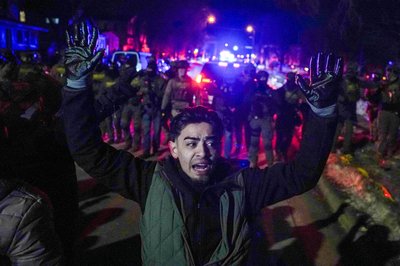NOTE: If you are short on time, watch the video and complete this See, Think, Wonder activity: What did you notice? What did the story make you think about? What would you want to learn more about?
SUMMARY
The Supreme Court heard arguments in a major case focused on parental rights and public schools. At the center of the case is a dispute over a curriculum in Maryland that included books featuring LGBTQ+ characters. Some parents asked for their children to be excused, but schools stopped allowing opt-outs the next year.
View the transcript of the story.
News alternative: Check out recent segments from the NewsHour, and choose the story you’re most interested in watching. You can make a Google doc copy of discussion questions that work for any of the stories here.
WARM-UP QUESTIONS
- Who are the individuals and groups mentioned in this story?
- What issue is the Supreme Court deciding in the case in Montgomery County, Maryland?
- Why do some parents want to opt their children out of the language arts curriculum?
- Why did the school district say that opt-outs would not be permitted?
- How could the Supreme Court's decision lead to opt-outs for other subjects like the teaching of evolution in biology or other topics that parents say offends their religious beliefs, according to Justice Kagan?
FOCUS QUESTIONS
- "Courts have said that exposure of ideas that — some may object to because of their religious beliefs, [does] not violate the free exercise clause in the First Amendment," Marcia Coyle said. Do you think students should be able to opt-out of the curriculum based on religious beliefs?
- If you were a school administrator or teacher being told what you could or could not teach, how would you feel about your role as an educator? In general, what do you know about how your school decides on what it teaches? Who decides? (This can vary from school to school.)
Media literacy: Who else would you have liked to have heard from in this story?
WHAT STUDENTS CAN DO
What do you know about the First Amendment of the Constitution? Learn more about the First Amendment by reading it here:
"Congress shall make no law respecting an establishment of religion, or prohibiting the free exercise thereof; or abridging the freedom of speech, or of the press; or the right of the people peaceably to assemble, and to petition the Government for a redress of grievances."
Answer the following question in your notebook/computer: What decision do you think the Court will come to and why? How do you think they will interpret the First Amendment when it comes to their decision?
Fill out this form to share your thoughts on Classroom’s resources.





